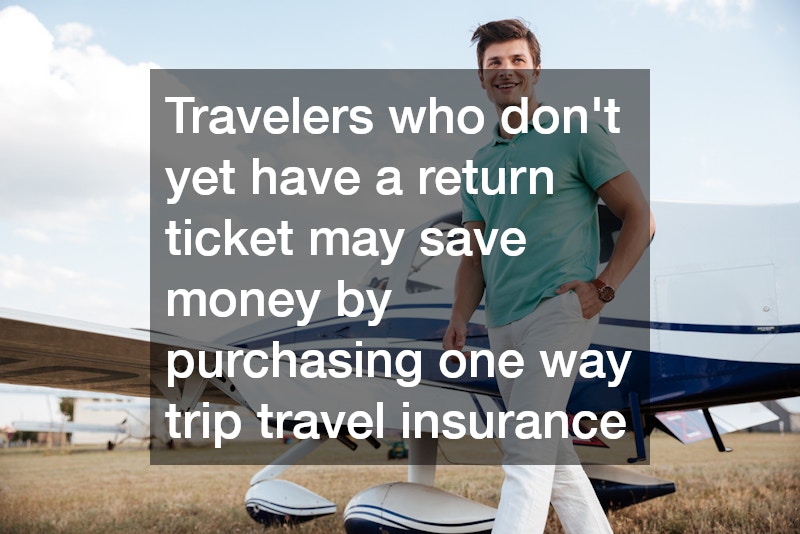

If you’re planning your next vacation when on a budget, you might be tempted to skip buying travel insurance. According to Forbes, buying travel insurance can be worth its price. However, if you do purchase travel insurance, you should know there are many types of insurance plans. Be sure you know what your policy covers – and that its coverage is what you need and want.
One common type of travel insurance is called travel and accident insurance. Those policies will cover you if you are injured or die during your trip. Flight accident coverage provides a similar type of coverage, but the injury or death must take place during an airline flight. These policies cover airline passengers, pilots, and stewards for injuries (specifically, death and dismemberment.)

According to Two Tickets Anywhere, travelers who don’t yet have a return ticket (or those with an alternate way to get home) may save money by purchasing one way trip travel insurance. If the trip you’re taking is with a group, be sure to check the contract you signed when you booked your tickets before buying travel insurance. Your group may have included group trip insurance with the cost of the tickets.

No matter where you are going on your vacation, whether you are going across the globe to trek through the Himalayas, take your family on free birthright trips to Israel, you are taking a trip to through Europe, there are a lot of reasons to get travel insurance. Before you book your flight, it is important to look at all of your option and what your needs will be.andnbsp;
This can be a real challenge for a lot of people. Luckily, the New York Times has put out a guide to getting the right kind of travel insurance for your needs and your trip. According to the co-founder of TravelInsurance.com, a website that compares travel insurance plans, there are a huge variety of insurance policies and plans that people can choose from. Often there are pages and pages of legalese that many people have a hard time working through, says Sandberg.
Sandberg says that one reason many people take out insurance policies before they book their flights is that they bring a lot of peace of mind along with. Insurance plans for travel can cut down on what a traveler has to pay if something goes wrong and the trip has to be canceled. If a vacation has to be canceled, with travel insurance, the amount a person will pay will be between 4% and 10% of the total cost for the trip, as opposed to all of the price tag.
Sandberg offers these tips for getting the right plan for your travel insurance:
Think about what your needs are. Different kinds of trips have different needs when it comes to the travel insurance policy that is purchased. Some travelers are only concerned about the hotels they have booked, the airline flights they have reserved, and/or the cruise they have selected. For people who are going to more remote places, have health conditions, or are doing something more adventurous, medical insurance may be needed. There are travel insurance policies that bundle different coverage options. These will cost more.
If your travel plans are basic tourist stuff, you may not need to get the medical coverage. There are policies that exist just to cover your financial liability for canceling a the last minute. On the other hand, if you know you are going to go to your destination, come hell or high water, a plan that has medical coverage but not a cancellation plan may be the best for you. These can be very inexpensive policies and can be bought for a price tag of $50 per traveler to start with.
Before any flights are booked or insurance bought, it makes sense to check with your health insurance carrier first. There are plans that cover international travel and all have plans for what you should do if you are ill or injured but have not left your state. Having that information can make a difference in what, if any, medical coverage you buy when you travel.
Regardless of where you are going and whether it is inside or outside of the United States, medical travel insurance can help pay what for your health insurance policy will not cover. Not every medical issue that needs care is an emergency so if you contract a stomach virus, you may need treatment but not from an emergency room.
If your trip will feature certain activities that incur a higher risk for an accident such as bungee jumping, scuba diving, skiing, mountain climbing, and some others may cost you more in terms of travel insurance for medical issues. Some medical insurance policies do not even cover injuries doing these things so you need to check with the company before you sign on the bottom line. In some areas, your insurance, whether it is a travel plan or not, you may still have out of pocket costs if something happens. If you decide to trek in Nepal, to Everest or elsewhere, trekkers are expected to pay if they need to be airlifted out via a helicopter.
The most flexible plans for travel insurance are the plans that only cover the costs you have paid for your trip if you had taken it but were forced to cancel it.